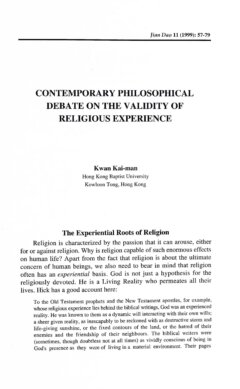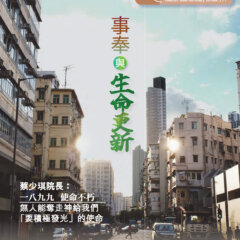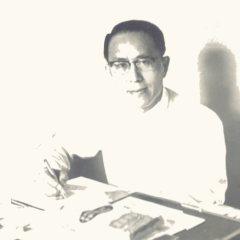Contemporary Philosophical Debate On The Validity Of Religious Experience(近代宗教哲學有關宗教經驗的論爭) / 關啟文
撮要
近年來,分析哲學中的宗教哲學甚為興盛,宗教經驗論證亦因而復穌。其中一個爭論非常熱烈的課題便是「宗教經驗的真實性」。不少哲學家有力地維護這論證,他們包括斯溫伯恩(Richard Swinburne)、奧爾斯頓(William Alston)、格庭(Gary Gutting)和格爾曼(Jerome Gelman)。筆者在本文中首先概述這論證如何在當代哲學家中復興,接著解釋這論證為何在直覺上有一定的說服力,然而也有 不少表面上的困難——這些困難可歸納為十種常見的反駁。筆者會簡評以下六種反駁:
1)宗教經驗是在不正常的情況下產生的;
2)在邏輯上來說,主觀經驗和客觀實在之間有不可逾越的鴻溝;
3)宗教經驗嚴重地被理論滲透;
4)我們很易為宗教經驗提供自然主義的解釋;
5)宗教經驗在本質上是私人的;
6)宗教經驗的真實性是不可檢證和不可證實的;
筆者的主張是:以上的反駁沒有一個能成功推翻宗教經驗的可信性。
筆者接著討論另一個反駁:「因為宗教經驗跟感官經驗是如此不同,所以宗教經驗都是純主觀的。」筆者論證兩者之間的差異往往被誇大,並進一步指出這反駁預設了一種知識論的帝國主義為其前提,而這是不合理的。筆者的結論是:雖然還有很多反對理由要評估,但據以上討論顯示,宗教經驗論證仍未被推翻,且很有活力,它是相當值得我們認真研究的。
ABSTRACT
In recent years, the field of analytic philosophy of religion has greatly flourished. One hotly debated topic is the validity or veridicality of religious experience. This is due to the revival of the argument from religious experience which is ably defended by Richard Swinburne, William Alston, Gary Gutting, and Jerome Gellman among others. In this paper, I first survey the revival of this argument among contemporary philosophers, and then explain both its intuitive force and prima facie difficulties (which are due to ten stock objections to religious experience). Six objections are briefly discussed:
1) that religious experiences are induced under abnormal conditions;
2) that there is an unbridgeable logical gap between subjective experience and objective reality;
3) that religious experiences are heavily theory-laden;
4) that naturalistic explanations of religious experience are readily available;
5) that religious experiences are essentially private;
6) that the validity of religious experience is uncheckable and unverifiable;
I contend that none of these objections succeeds to discredit religious experiences.
I then discuss the objection that since religious experiences are so unlike sense experiences, they must be subjective. I argue that the disanalogy is often exaggerated. I further point out that the argument presupposes an illegitimate premise which amounts to a kind of epistemic imperialism or chauvinism. I conclude that although many objections still need to be assessed, the argument from religious experience is alive and well, and well worth serious investigation.
原載於《建道學刊》11期(1999年1月),頁57-79。







